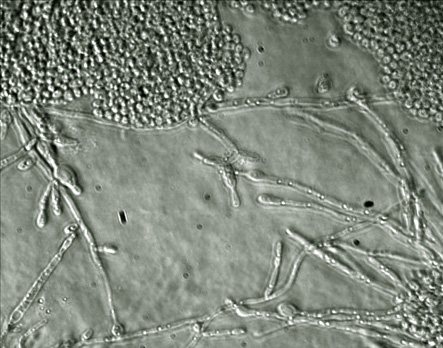Eliminating These Fungal Infections Is Vital For Getting Rid Of Cancer
 |
Fungus and Cancer - The Candida Fungus
|
Some doctors theorize that candida or other systemic fungal infections cause or at the very least contribute to the development of cancer. When you examine the link between fungus and cancer
further, this makes sense. A body wide candida infection plays havoc on
the immune system. Not only does the immune system become overwhelmed
and worn out from fighting the infection, but candida (or other fungus)
excrete toxins that further weaken and harm the body.
The major waste product of candida is acetaldehyde, which produces ethanol. Ethanol may be great in cars, but in your body it causes
excessive fatigue, and reduces strength and stamina. In addition, it
destroys enzymes needed for cell energy, and causes the release of free
radicals that can damage DNA.
Ethanol
also inhibits the absorption of iron. Because iron is one of the most
important oxygen supports in the blood, ethanol in your body creates
low oxygen levels. And you know what happens when your body can't
oxygenate well. Deal with candida if you want to beat cancer.
There is a simple test to tell if you have candida overgrowth.
First thing in the morning, before you put ANYTHING in your mouth, get a clear glass of water. Better still; leave it by your bed the night before. Work up a bit of saliva, and then spit it into the glass of water.Check the water every 15 minutes or so for up to one hour. If you have a candida yeast infection, strings (like legs) will travel down into the water from the saliva floating on top, or "cloudy" saliva will sink to the bottom of the glass, or cloudy specks will seem to be suspended in the water. If nothing develops in 30 to 45 minutes, you are probably candida free.
Some doctors implicate fungi as a cause of leukemia.
In 1999 Meinolf Karthaus, MD, watched three different children with
leukemia suddenly go into remission upon receiving a triple antifungal
drug cocktail for their "secondary" fungal infections.
In
1997 Mark Bielski stated that leukemia, whether acute or chronic, is
intimately associated with the yeast, Candida albicans, which mutates
into a fungal form when it overgrows.
Milton White, MD. believed that cancer is a chronic, infectious, fungus disease.
He was able to find fungal spores in every sample of cancer tissue he
studied. Some other doctors agree with him. Such as the Italian doctor
who has his patients take a teaspoon of bicarbonate of soda, baking
soda, in a glass of water half an hour before breakfast. This
alkalinized the digestive tract so that it would help eliminate candida.
Also
advocating the fungus and cancer connection, Author Doug Kaufmann
asserts that fungi in foods may play a role in cancer. He has seen
children become free of their documented leukemia once the child's
parents simply changed the child's diet. Kaufmann's diet is base on the widely published problem of mycotoxin contamination of our grain foods.
Grains such as corn, wheat, barley, sorghum, and other foods such as peanuts, are commonly contaminated with cancer-causing fungal poisons called mycotoxins. One of them, called aflatoxin, just happens to be the most carcinogenic substance on earth.
He
says we consume, on average, from 0.15mg to 0.5mg of aflatoxin per day.
So it is not sugar alone that is the problem in our western diet, but
fungal toxins that are found in the sugary grains. More than once has
Kaufmann interviewed a caller (on his health talk show) who absolutely
craved peanut butter and popcorn just prior to their diagnosis of cancer.
Kaufmann feels that antibiotics
may play a role in this. Antibiotics destroy the normal, protective gut
bacteria, allowing intestinal yeast and fungi to grow unchecked.
Resulting in Candida overgrowth. This can lead to immune suppression,
symptoms of autoimmune diseases, or even cancer.
"If
the onset of any symptom or disease, cancer included, was preceded by a
course of antibiotics," he says, "then look for a fungus to be at the
root of your problem."
No comments:
Post a Comment